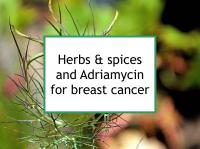The current webpage is designed to make additional research available concerning how certain culinary herbs and spices or their major bioactive components can act as doxorubicin sensitizers or protect against its side effects. At the bottom of this webpage are links to studies relating to the beneficial herbs and spices in Foods to eat and avoid during doxorubicin.
The following herbs and spices or their extracts have been tested and found specifically to enhance the treatment effects of doxorubicin in breast cancer or protect against its toxic side effects:
Generally speaking, herbs and spices heighten the cytotoxic effects of doxorubicin or protect against its side effects (without reducing its efficacy) through the actions of certain polyphenols, among them:
- Allyl isothiocyanate (found in horseradish & wasabi, as well as mustard)
- Apigenin (celery seed, Mexican oregano, parsley)
- Beta-carotene (basil, cilantro)
- Capsaicin (chili powder, hot sauce)
- Carvacrol (black cumin, Mexican oregano, oregano)
- Cinnamic acid & cinnamaldehyde (celery seed, cinnamon)
- Crocin (saffron)
- Curcumin (turmeric)
- Ferulic acid (cinnamon)
- Gingerol, 6-shogaol & zingerone (ginger)
- I3C & DIM (horseradish & wasabi, mustard)
- Kaempferol (saffron)
- Lutein (basil, cilantro, parsley)
- Luteolin (celery seed, oregano, thyme)
- Myricetin (parsley)
- Naringenin (Mexican oregano)
- Piperine (black pepper)
- Quercetin (chili powder, hot sauce, Mexican oregano)
- Rosmarinic acid (oregano, rosemary, thyme)
- Sulforaphane (horseradish & wasabi, mustard)
- Thymol (black cumin, oregano, thyme)
- Thymoquinone (black cumin)
- Ursolic acid (basil, rosemary, thyme)
- Vitamin C (horseradish, chili powder, hot sauce, parsley)
Please read the applicable food webpages when making your own food lists since these pages contain important advice, food rankings (e.g., highly recommended, recommended in moderation), consumption limits, and other pertinent information.
Herb and spice compounds should be obtained by eating them in food rather than taking supplements. When a beneficial micronutrient is administered at low doses by consuming food, it is likely to have subtle chemopreventive effects, whereas the same compound administered at high doses is more likely to have pharmacological effects, with possible unwanted outcomes.
Herbs and spices should also be consumed in moderation. Most herb oils and concentrates should be consumed infrequently in modest amounts or avoided (see the relevant food web page). For example, basil pesto incorporates eugenol (the amount depends on the basil variety) which, while it does have anti-cancer properties, is toxic enough to suggest that basil pesto should be consumed in modest amounts up to once per week rather than on a daily basis.
